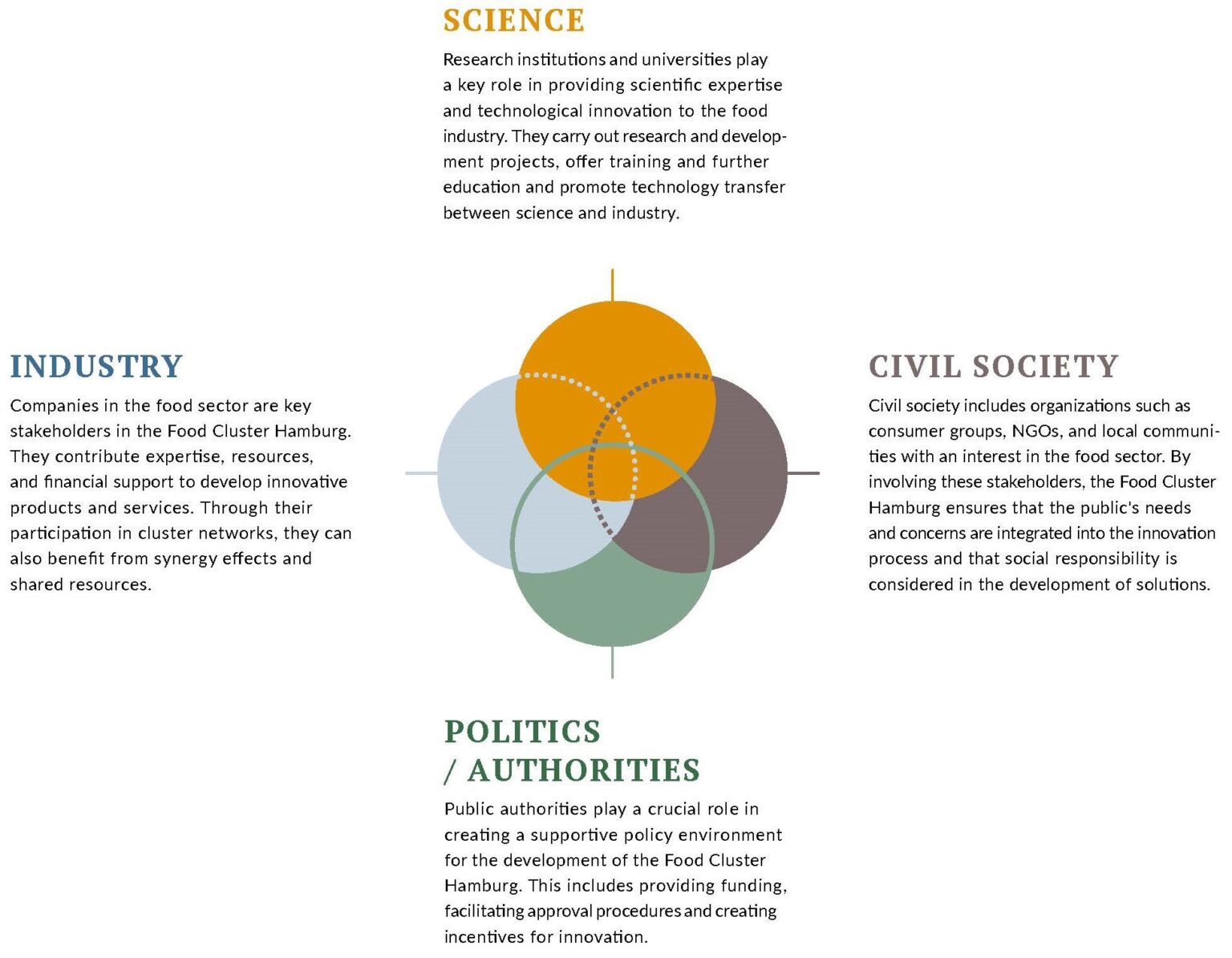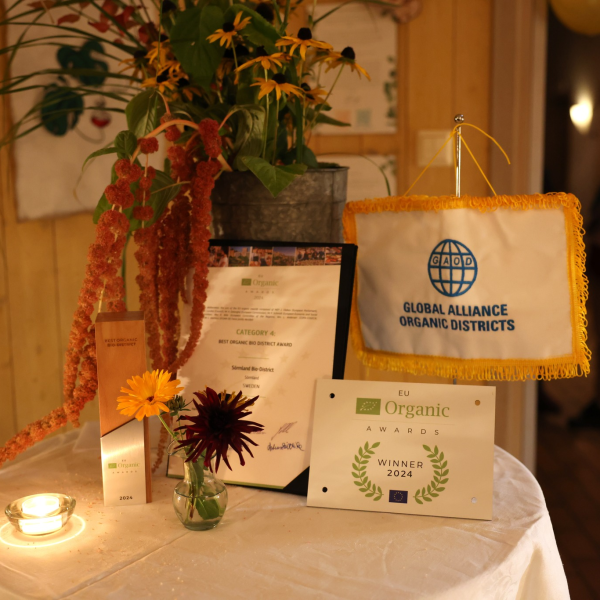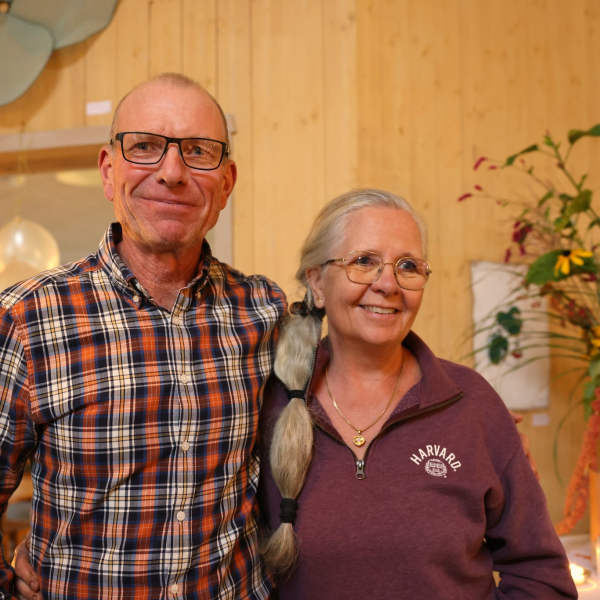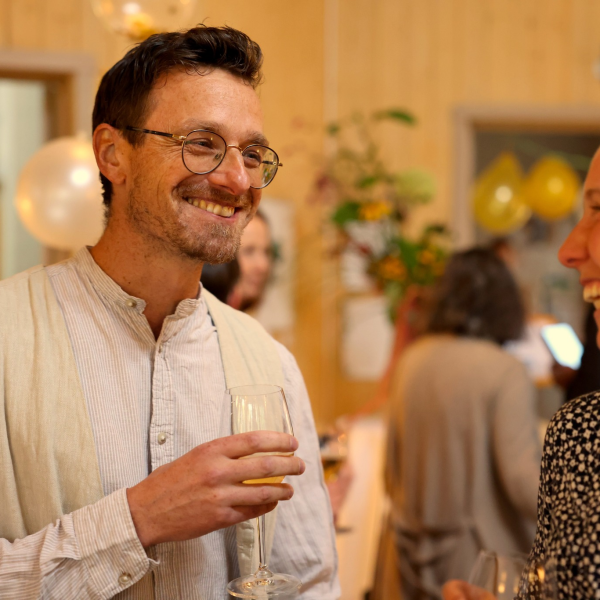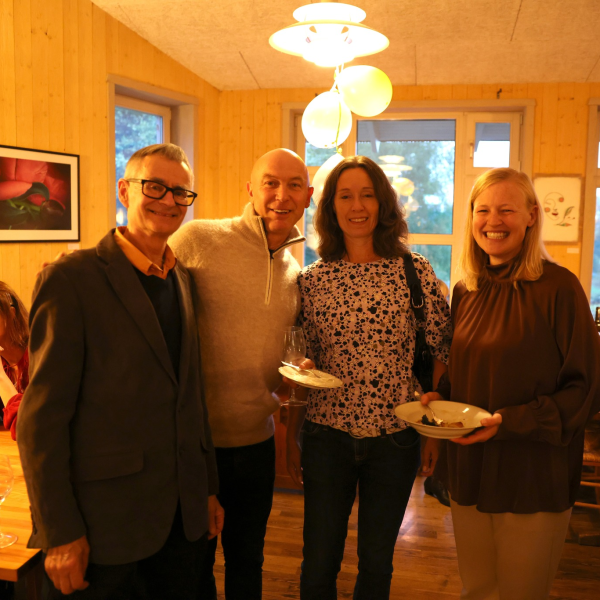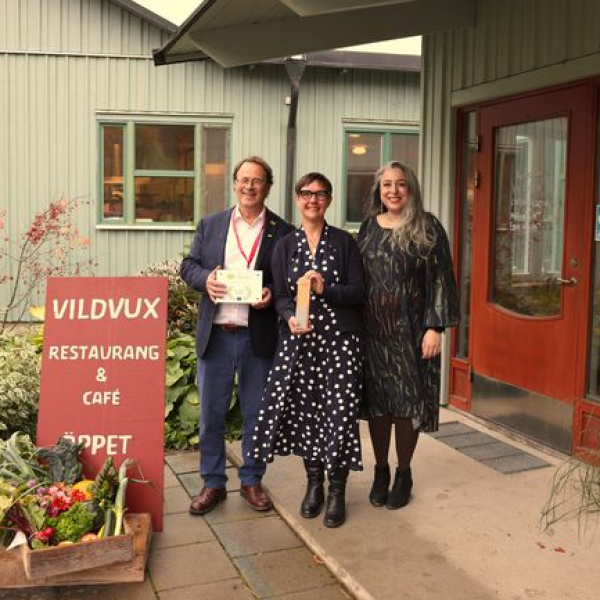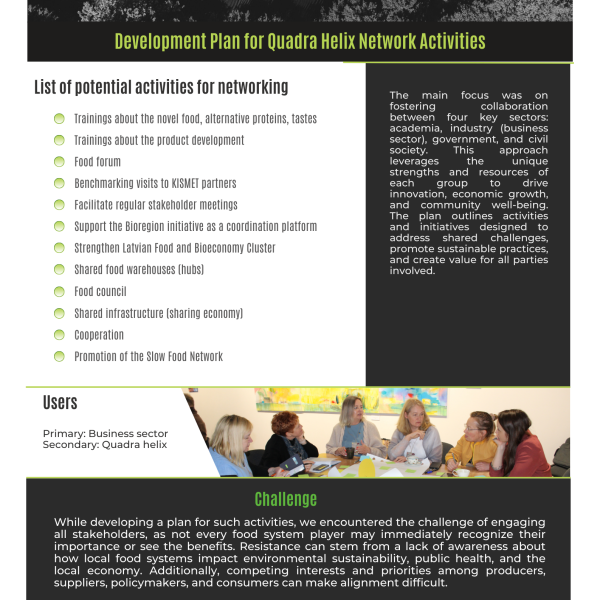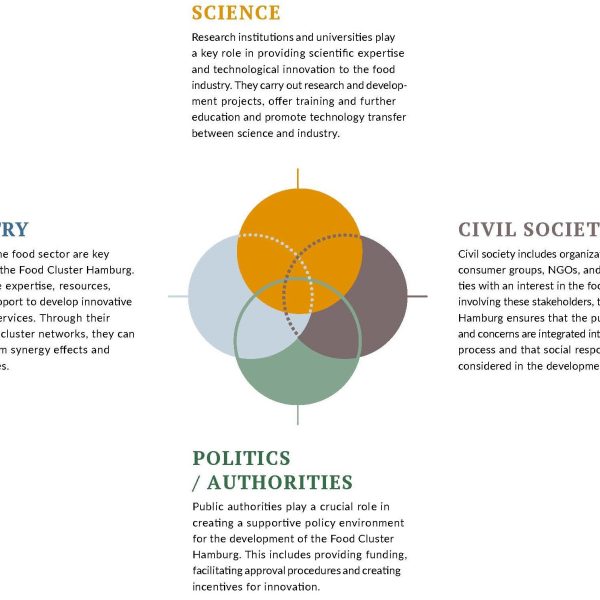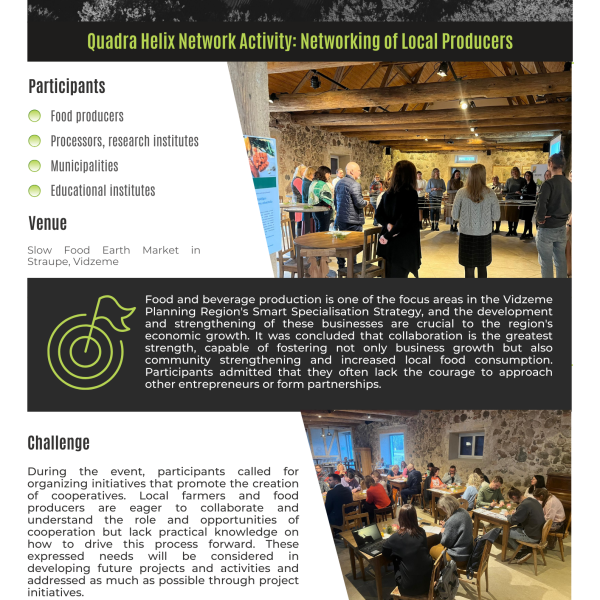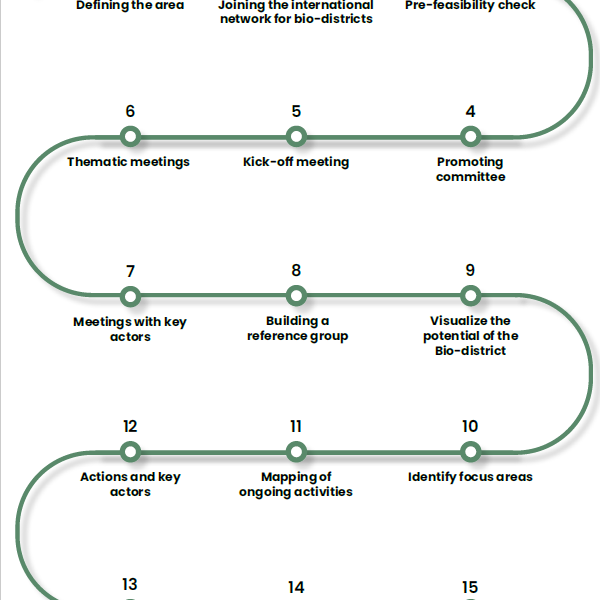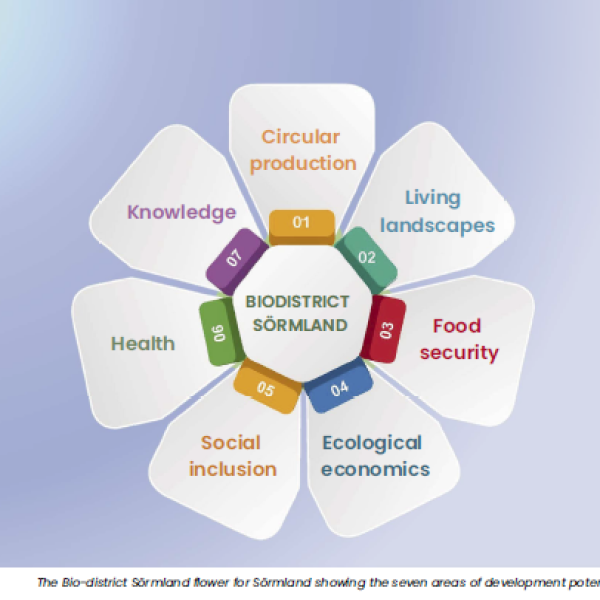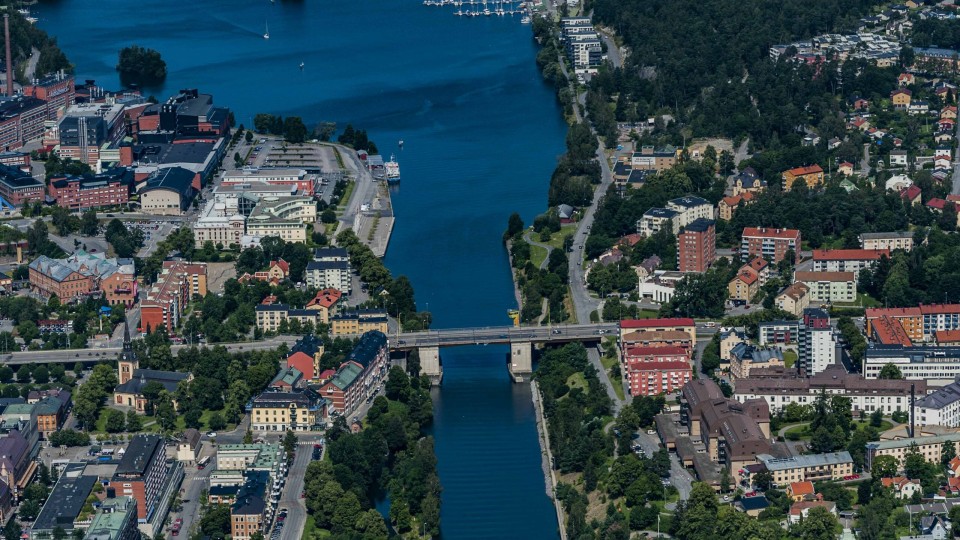Currently, the food system is confronted by a variety of challenges, including food security, sustainability, and public health. This highlights the need for an integrated approach. In this context, the Quadruple Helix model provides a framework for us-ing the collective knowledge and resources of academia, industry, government, and society. Setting up a development plan will increase cooperation, and knowledge sharing among these groups.
This concept aims for coordinated efforts that bridge the gap between research, market and policies. Ultimately, the goal is a more connected local ecosystem with more networking, collaboration and business development opportunities. To achieve this, a development plan can contain networking activities including B2B meetings, partner searches, matchmaking events, and workshops focused on various aspects of the food chain.
How to do it
Suggested actions
- Identify a goal or vision that is shared between the different actors.
- Invite groups of society, companies, science and the public sector to work on innovative food products.
- Include financial and possible political discussions from the beginning.
- Create a framework for the network/partnership and develop it into a partnership model.
- Create thematic working groups consisting of actors to drive the transformation of the local food system.
- Cooperate with researchers to involve them from the start.
- Organise networking activities such as training and forums.
- Benchmark with other KISMET partners.
Local adaptations
Hamburg, Germany
Setting up a quadruple helix network with partners from the public administration, companies, society and science for implementing new innovations in the food sector faster and more efficiently.
Södertälje, Sweden
Developing a strategy for Bio district Sörmland together with actors from business, civil society, the public sector and research. Thematic working groups of different actors will drive the transformation of the local food system.
Vejle, Denmark
Culinary Institute is establishing a quadruple helix partnership to connect food-related actors in and around the mu-nicipality. This innovative collaboration will prioritise practical, actionable outcomes, such as optimising local food val-ue chains, reducing food waste through advanced technologies like AI, and fostering sustainable food systems. The Culinary Institute by Vejle Erhverv will play a pivotal role, acting as the central hub to connect and coordinate stake-holders, ensuring a seamless and productive start of this partnership.
Vidzeme, Latvia
Widening the local network and improving the region’s lack of knowledge and cooperation by organizing networking activities such as B2Bs, partner searches, benchmarking visits, matchmaking events, and workshops on different food chain aspects.
KISMET Actions & Tools
The Food Cluster Hamburg
The Food Cluster in Hamburg created a graphic that visulasizes its quadruple helix approach and how to implement it.
The Bio-district Sörmland (Södertälje)
The Roadmap for building a Bio-district in Sweden
Central to the creation of Bio-districts is an inclusive systems approach encompassing local food, gastronomy, lifestyle, culture, urban-rural relations and tourism, based on ecological principles of Health, Ecology, Fairness and Care. Bio-districts also have great potential to raise awareness of the importance of food for the climate, biodiversity and human health.
The creation of a Bio-district is about bringing together different actors within a region to jointly find solutions to increase food security, create jobs and develop an ecologically, socially and economically sustainable food system.
This roadmap describes 18 steps, that we have followed to build the first Bio-district in Sweden. Each step focuses on a different aspect of building a Bio-district, from understanding your context and involving actors, developing a Bio-district strategy to formalizing the organisation.
The EU Organic Awards 2024
The EU Organic Awards 2024 celebrated eight outstanding winners for their contributions to organic farming and sustainable practices.
Sörmland Bio-district received the Best Organic Bio-district award for its pioneering role in organic farming since the 1940s. With 20% of its farmland dedicated to organic practices, Sörmland connects farms, food pro-cessors, and restaurants to promote local products and sustainable tourism.
Jostein Hertwig from BERAS foundation: „This really inspires us to provide organic food in the area. Also, it offers a lifestyle that is attractive to young people and therefore secures our future.“
Celebration of the EU Organic Award September 27, 2024
Further links
List of activities for networking (Vidzeme)
The main focus was on fostering collaboration between four key sectors: academia, industry (business sector), government, and civil society. This approach leverages the unique strengths and resources of each group to drive innovation, economic growth,and community well-being.The plan outlines activities and initiatives designed to address shared challenges, promote sustainable practices,and create value for all parties involved.
Related knowledge
Food Cluster Hamburg
The Food Cluster Hamburg has been created to develop a sustainable food cluster in Hamburg in cooperation with the metropolitan region. The study report offers i.a. guidelines for the development of the Food Cluster Hamburg and recommendations for actions.
Food Supply Strategy for Södertälje Municipality
The goal of this strategy is to secure a good supply of food for Södertälje municipality’s growing population with safe, healthy, and sustainably produced food in sufficient quantities, both now and in the future.
Södertälje Food Supply Strategy aims to centralise the importance of food-planning and supply to municipal process-es. The strategy serves as a guide in all municipal planning processes and operational management to ensure a robust food system and supply. The Food Supply strategy also aims to facilitate cooperation, dialogue, and consensus among different actors in the food system, including public, private, and non-profit organizations.
It does this through three focus areas:
- Land-use and urban planning.
- Private food sector and municipal operational activities.
- Crisis management and preparedness.
GoSmart BSR, Summary Report of applicable concepts > Quadruple Helix
The review and analysis of applicable theoretical concepts was the first step for designing and developing the Trans-national Innovation Brokerage System. The report states that The Quadruple Helix concept can serve as an architec-tural innovation blueprint that engages simultaneously four sectoral perspectives (government, university, industry, and civil society).
Matlust test bed
Matlust test bed aims to bring sustainable food products & future food to the market. Four things are tested:
- feedback and acceptance from the guests/ diners (pre-school/school children, elderly).
- kitchen staff evaluation of properties regarding handling, cooking, etc.
- fulfilment of regulations regarding work environment and food safety.
- how to communicate new products to get acceptance and spread knowledge.
I.N.N.E.R guidelines and toolkit
An Introduction and Tool Kit to support the start-up of new and the management of existing Organic Districts.
Partnerships for green transition (Partnerskaber for grøn omstilling)
This paper suggests that today, there are expectations relating to the fact that partnerships can help accelerate pro-found transformations in societal areas such as food and energy systems. The authors note that such an acceleration contribution changes the partnership game rules.
FOODpaths
This project, funded by the European Commission, aims to create a framework for the future European Partnership for Sustainable Food Systems for People, Planet & Climate, which launches in 2024 and fund research and innovation activities. The project seeks to engage actors across the food system to establish the operational environment for the Partnership, including the creation of a network of European universities working on food systems. Related material Partnership Inclusivity recommendations and Literature review on business models for sustainable food systems (SFS).
FoodCLIC
The EU-funded FoodCLIC project will create more sustainable urban food environments by building strong science–policy–practice interfaces (i.e. food policy networks) and experimenting with innovative approaches and business models in Living Labs across eight European city-regions.


